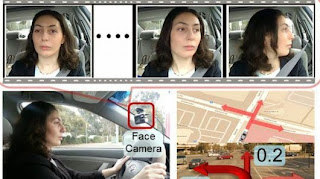Wouldn't it a cool to have a system or camera in a car and it could predict how or where you are driving? Well, that's the idea behind 'Brain4cars' it's suppose to measure how much human error is done while we are driving. We all know that nowadays car accidents are mainly done because of human error so it is vital to find out how we can improve on those shuttle errors. Researchers at Cornell and Stanford are doing just that.
The driver is put behind the wheel is driving normally as they would, a camera is mounted behind the wheel while it uses sensors and camera face recognition technology. The green dots are picking up the small face gestures and detects whether a 'human error' is taking place a few seconds before it happens. Now, that's amazing.
Along with face detection it makes predictions by head and body movements to tell where the driver wants to make a turn. A GPS system also warns the driver if he/she is about to make an illegal move.
To develop the system, Cornell's Ashutosh Saxena and his colleagues recorded video of 10 drivers and combined it with video looking forward from their cars as they drove. In all, almost 1,200 miles of city and highway driving over two months was recorded and analyzed.
Computers learned to correlate certain head and body movements with impending driving maneuvers. When tested later with a different set of drivers, the technology correctly predicted driving maneuvers 77.4% of the time. On average, a turn or lane change was anticipated more than 3.5 seconds before it happened.
More refinement is still needed, according to the researchers. Sometimes, the face tracking system could be thrown off by passing shadows. Also, drivers interacting with passengers could confound the system. And some driving situations, like turning from a turn-only lane, don't always involve the same physical cues.
Eye-tracking capability and more sophisticated cameras could be added for greater precision. Sensors could be added to the steering wheel and pedals to pick up a driver's movements.
So far, this technology is in the early stages, but the researchers are in active discussions with automakers, Saxena said.









0 comments:
Post a Comment